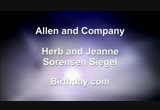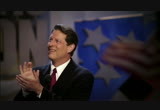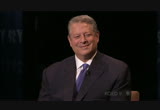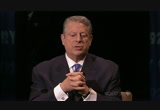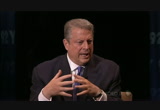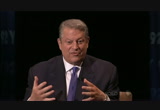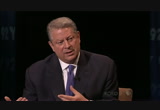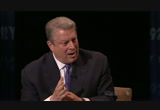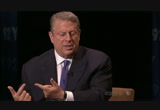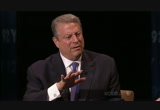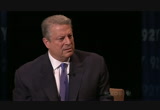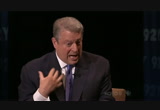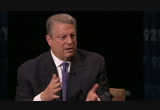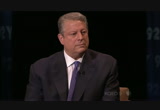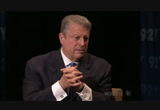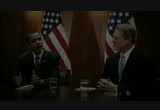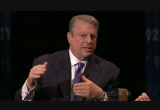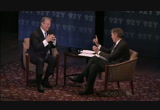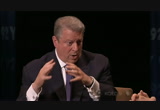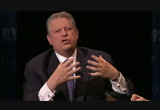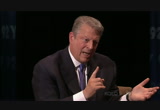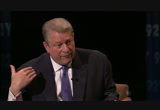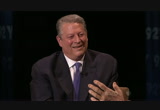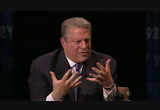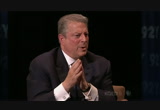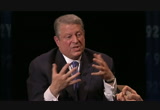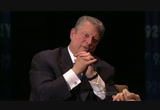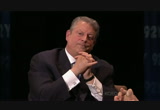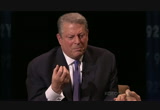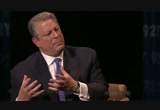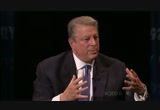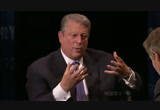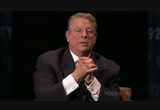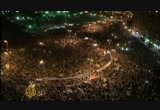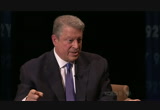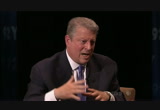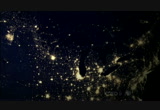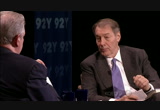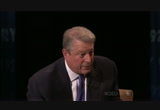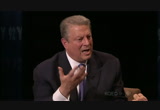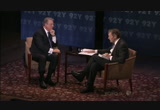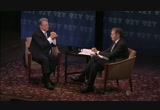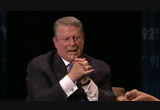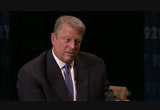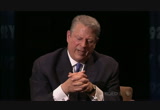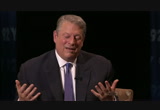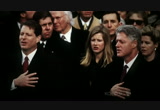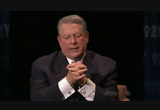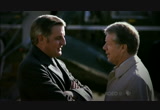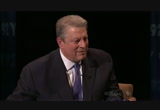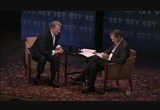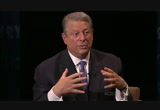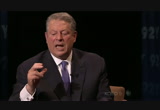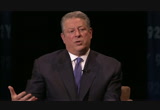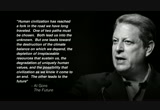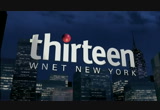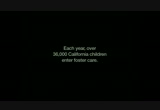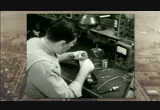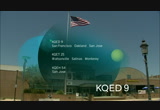tv Charlie Rose PBS February 1, 2013 12:00pm-1:00pm PST
12:00 pm
captioning sponsored by rose communications from our studios in new york city, this is charlie rose. al gore grew newspaper tennessee and lived in washington d.c. the son of a united states senator. he then went to harvard, went back to tennessee, became a congressman and then a senator, then vice president and inn 2,000 he ran for president and he lost. then after some soul-searching he began to decide what he wanted to do. he was an environmental activist and for that work in 2007 he won an oscar for his documentary, an inconvenient truth. that year he also won the
12:01 pm
nobel peace prize. his latest book is called "the futurist" i spoke to him on tuesday if he 90-- 29nd street y here in new york and here is part of that conversation. >> i should take note of the fact that this book is dedicated to his mother, pauline gore who died at age 92 in 2004, his father died when he was 90. this is good genes, i'm telling you here. and in the dedication to her he said she gave me a future and a an abiding curiosity about what it holds and a sense of our commune human ablegation to help shape it. so this book is about the question of what are the drivers that are changing the world and the forces that are making the future real and significant and extraordinary. tell me how you came to this book and what you hope for to us understanding about the future. >> well, thank you, charlie. you play a unique role in
12:02 pm
our country, i'm not buttering him up when i say i know you'll agreement i think you're the bester int interviewer that we have in our country, it's great to be with you. (applause) >> and i have thereby ruined every other interview that i will do for this book, i'm sure. i can't-- but thank you for all those kind words. and thank you all for coming. it's great to be back at the 92nd street y. i want to give a shout out to all of the folks at jccs around the country and those on the stair masters upstairs who are watching on the screen. i've always been fascinating by those who try to interpret the evidence compiled by expert communities that have relevance to our common
12:03 pm
future and i've focused on that in my ca reeferment i did that on climate in the digital world. about eight years ago i went to a conference in switzerland and somebody kd me what are the drivers of global change and i gave an answer, if you were asked you could give a real intelligent answer and i gave what i thought was a good answer. but on the plaechb flight back home the next day the question kind of kept bugging me a little bit and i thought to myself that is kind of an interesting question to dig in on. i took out my computer and made an outline. they served the meal and when the meal was over i spent the rest of the six hour flight filling it out and i came back to it over and over and over again. it just kind of drew me back. and two years ago i decided that it had become useful enough, my colleagues and i
12:04 pm
at generation investment management had used it as one of our inputs in building an investment model and it had worked pretty well as a way of interrupting what is going on in the world. and when my editor john meacham, he left "newsweek" and went to random house and i said wow-- . >> rose: moved back to nashville, by the way. >> yeah, after, in the course of this whole project, he and his wife, and he had made that plan. and i thought it would be fun to have an editor like john. and it really caused me to think well, maybe i will turn this into a book. and the last two years i have really dug into it. i moved all the furniture out of my living room in nashville, i put up giant white boards, had directed research, 15,000 pages worth. and here's what i lirnle lirnled-- learned, charlie. >> we'll talk chap per-- chapter by chapter. >> more death, but there has
12:05 pm
never been a time in human history when we've had so many truly revolutionary changes going on simultaneously. the genetic revolution. we're crossing the boundaries between species slicing genes, enhancing human traits, selecting traits, curing diseases. the digital and commuter revolution which is completely transforming the way we relate to one another in our communities, in our nations and the world as a whole. its tremendous growth of the awe ton me which is pressing against certain resource limitations and also the way we define growth which is causing very serious problems. the globalization of the economy which i believe has created a new entity that i call earth inc. where
12:06 pm
factories, where large corporations have virtual factories that span the globe. and they have a new relationship to labor, capital, natural resources, nation states, it's a completely new reality. and these and other-- including the rise of china, other emergent centers of power, the roll of the u.s. changing, something we need to address as americans, and i set out to try to discover how these multiple revolutionary changes are interrelating one to the other and what choices they pose to us. how we really have to get involved in steering our way into the future, and choosing options that can make it better than it otherwise might be. >> in order to take advantage of all these forces, though, you also suggest that democracy in
12:07 pm
part has been hijacked, that washington has become dysfunctional. >> yeah. >> and that threatens our ability to use all the tools. >> absolutely. we have two macro tools to use in shaping our future, roughly speaking. democracy and capitalism. in the world of political systems the alternatives to democracy have been tested and found wanting, no need to go into the details. the same is true in economic theory, all the alternatives to capitalism. capitalism efficiently allocates resource, balances supply an demand, conducive to higher levels of freedom and unlocks a higher fraction of the human potential. but both democracy and capitalism have been hacked, a computer term, meaning that the interlogic or the operating system has been taken over.
12:08 pm
to focus on democracy the design of our founders here in the u.s. has been subverted by the influence of big money, lobbyists, special interests, corporations declared to be persons, money declared to be speech, might equated with right, and that's the reverse of what is, what was intended by its whole idea of america. we're individuals converse. and in the conversation of democracy, try to lift up the wisdom of crowds. try to lift up the best ideas as judged by the citizenry and use that to guide our choices. we've made better choices than any other nation over the last two centuries and that fundamentally is the reason why america has risen.
12:09 pm
but we've been making a lot of really bad and dumb choices because our democracy has been hijacked. >> but at the same time you suggest america is the best hope for the world in terms it of this future that we look at. >> yeah. and i have done some interviews with alice overseas embargoed for when the book comes out today and often foreign interviewers have said oh, you think america is the only nation that can lead the world. and i said well i know it comes off as me having too much pride in my own country but tell me, what other country can do it. the european union? please! i hope they get their act together. i really do. china? the world's to the going to follow china even east asia won't follow china. brazil, russia, who? >> rose: none of the emerging nations. >> i don't think so. and it's possible that a
12:10 pm
brand-new pattern will emerge from this resorting of wealth and power. but the world needs leadership now. on the issue of climate, water, topsoil, population, distribution of wealth in the global economy, you can go down the list. and the only obvious candidate to provide leadership in the word is united states. now many perceive the united states as having gone through a relative decline in power. there's evidence to that effect. but it's not clear that that is a persistent pattern. it is clear that the only way the united states can play what i think its natural role is, to provide leadership to the world o i do think that people around the world still look to the united states in spite of their disappointments, in spite of their concerns, as
12:11 pm
a kind of avatar among nations and if we are to play that role, those of us who are citizens of the united states have to reclaim the integrity of our democracy. it is failing us. the middle class is being hollowed out. somehow a majority or at least enough to stop, to continue filibustering in the senate, feel that it's way more important to further reduce the trivial inheritance tax on the wealthiest one tenth of 1 percent than it is to address the millions of unemployed who have needs that are not being met. and of course you could pair this-- (applause) >> in different ways. we really have to take stock of the fact we're not doing justice by our education system, by our infrastructure, by our research and development, by
12:12 pm
the policies that are needed to lift up the people of this country. and no government doesn't have to do everything. of course. we understand that. but you know, the idea of declaring the wealthiest few in the country, the job creators, well, the job creators are the people who either do or do not have money to go to the stores and purchase things and to do for their families. and when they can't the economy sinks. >> rose: i want to talk about all of those, whether the digital revolution, but with washington we just had an election. >> yeah. >> rose: president obama re-elected. we see now some movement towards immigration reform. >> yeah. >> rose: because elections have results. >> yeah. >> and they realize the latino population have shown their electoral strength is that where change is going to come from? because politicians finally began notwithstanding the corporate power that you mentioned, and the united
12:13 pm
decision by the supreme court, all of the things you referenced, that we have some possibility of regaining because elections have results and people see the-- and they want to come back to washington. and if, in fact, there are changes in the dem graphics of this country, we may have changes in policy. >> yeah. in the election last november the latino or hispanic community gave the republican party infra ocular trauma. and they realized that they will go extinct as a political party if they don't make the changes. and so no, it's very clear, what's happening. now i welcome it, i think it's great. and i think that president obama gave a terrific inaugural address. i was so pleased by his words on climate, for example, and i know we'll have a chance to come back to that. it's only one of the six drivers of change here.
12:14 pm
but on immigration i think he drove that issue home. as he did on gay rights which i thought was a wonderful part of the speech. and i think that we are seeing our nation change right before our eyes. partly as a result of this election. >> you have changed in december of 2012, you wrote a piece in rolling stone, very tough on the president. >> i think it was back in the summer of 2012. >> tough on the president, saying it wasn't using the bully pulpit. saying he hadn't done all he could on climate change and yet once you saw the inaugural speech you seem to have changed your sense of him and your assessment of what he is prepared to do, that perhaps he was prepared to do, what you had hoped he would do in the first term and move on climate change. >> well, i think that a lot has happened over the last year. and the piece you referred to was primarily about the news media's treatment.
12:15 pm
>> i'm going to get to that too. >> there was one paragraph about the president of course that became the news media's lead. >> right. >> but, yes, i stand by that. it was gentle criticism, but he took it to heart and he and i have talked about it. but look at what's happened since then. we had heard superstorm sandy, right, for the second time in 14 months, parts of this city were hit very hard, new jersey devastated, 60% of america was in drought last year. and the drought is continuing. we had 110 billion dollars in one year from climate related disasters, half of the north pole is gone. the sea level is rising, the storms are stronger, all the rest. and yet, in spite of that, we went through an entire presidential campaign without one single question
12:16 pm
being asked by anyone in the news media in any of them voluminous number of presidential debates about the climate crisis, that is pitiful, pitiful! (applause) and-- the now if you have been on one of those panels i know that the question would have come. and that's where we went wrong. >> from your mouth to god's ears. >> yeah. but, but honestly, it's like it's a memory hole. it's weird. but i think that superstorm sandy was a threshold event. and i think-- . >> rose: because you believe that it was a direct result of climate change or as someone said we can't say that, even the mayor said that. however-- go ahead. >> rose: you gave me that look like, you know better. >> well, look, the leading scientists, jim hanson, for
12:17 pm
example, kevin trendberg, for example, others have pointed out that this whole rhetorical debate about whether you can have a single cause and a single affect or whether there is a systemic causation, here's the systemic causation, that links climate change to superstorm sandy. the fact is, we're putting 90 million tons of global warming pollution into the earth's atmosphere every day as if it is an open sewer. it traps heat, it obeys the laws of fisks. the amount of extra heap trapped each day is equivalent to the energy released by 400,000 hiroshima atomic bombs every day. that's a lot of energy, even on a big planet. and one of the things that does is it evaporates more water off the oceans which puts more water vapor into the sky, 4% more in the last 30 years, and then when that waterfalls, either as rain
12:18 pm
or snow, it comes in much larger downpours, which causes larger floods. the winds get stronger. the storm, the storms are more intense, the sea level is up. all those things converged on sandy. but the very fact that there is 4% more water vapor in the atmosphere, not just above the place where the raindrops fall, you know, you have a bathtub filled with water, you open the drain, the water going down the drain just come just from the part of the tub directly above the drain t comes from the whole tub. and when there is a storm that it stretches out 2,000 kill 3450e9ers, often, and funnels toward the downpour so look what happened today in australia. they had two and a half feet of rain in queensland, okay. all over the-- pakistan, 20 million -- >> had to you will cat military in to rescue people. >> of course, and in
12:19 pm
pakistan 20 million people drive friend their homes, further destable leadsing a nuclear arm country. my home city of nashville two and a half years ago, thousands of my neighbors lost their homes and businesses in what was called a once in a thousand year downpour, none of them had flood insurance because they had never in living memory flooded in those areas. every storm is different now because we have altered the water cycle of the earth. >> rose: where is the solution that would make al gore happy? >> well, going back to the earlier exchange, we need to fix our democracy and we need to fix capitalism. our democracy has been hacked, as i said, money plays way too big a role. and we need to quickly migrate our democratic institutions to the internet where individuals can once again have a two-way conversation and connect with one another and with their elected representatives. where markets are concerned,
12:20 pm
we need to address the distortions in capitalism. we have a focus on short-term profits and short-term decision-making that is completely absurd. 30 years ago the average holding period for stocks, this is all in the book, was seven years, now it's less than seven months. the normal process by which a bliss builds up real value is about a business cycle and a half, roughly seven years and now we see investors getting in and out on the basis of crowd psychology, trying to beat the crowd. and now here in new york, 50:55 to 60% of the trades on the new york exchange, 60% of the trades on the london exchange, are high frequency, high speed algorithm mick trades where, you know, it's not 90 days or one month or 1 week, it's a few milli seconds.
12:21 pm
>> rose: let me go back in your own personal biography for a second. when you left washington. >> yeah. >> rose: having lost the presidential election in 2004. >> did you have to bring that up again. (laughter) >> rose: you were the first one to say that you are a recovering politician. >> yeah, yeah. >> rose: and there is enough time so that there is unlikely to be a relapse. >> yeah, my confidence is increasing. i'm on about step nine. >> rose: here's the question. when did al gore become the al gore we know today with the strong opinions that you have. if seems that you've been liberated to say what's on your mind with no sense of consequence for whatever damage -- >> sounds reckless. >> rose: well, not reckless but certainly liberatedment i'm serious. was there a time in which you basically said i got nothing to lose. >> freedom is just another word. >> rose: yeah.
12:22 pm
thanks to countries christopherson, right, who wrote that song in nashville, by the way. >> he did indeed and janice joplin made it famous. >> rose: exactly. >> when did you become who you are today. >> well, see, i-- my narrative would be very different from that i wrote a book before i became vice president called earth in the balance which people said whoa, how can you just let things loose like that and say what is on-- i mean, you know, i've done that for a long time. when i ran for president the first time in 1988 i announced with a speech that said the reason i'm running is to bring more attention to the global warming crisis. >> right. >> and people said well that's nuts. i mean i thought then and i believe now that-- . >> rose: so the thesis that you may be more liberated now is not true? >> i don't think it is fundamentally but you are
12:23 pm
certainly right, if you want to say that in the years when i was in the congress, the senate, the white house and -- >> there was a question of whether you might run again in 2004 but you decided not to do that. >> yeah. >> because? >>. >> well, first of all, the the attack of 9/11 on this city and the pent begun and pennsylvania, was a defining event in many ways. and secondly,-- i, the critique i make of what has happened to our democratic system was one that i had already begun to really form. and i believe deeply in
12:24 pm
american democracy. i honor the profession of politics. i encourage young people to go into it. but i have found other ways to serve. i haven't turned my back on the political process. i am deeply concerned that the role of big money which i described earlier, has now degraded the operations of our democracy to a point that is causing deep concern to millions of us. it really has to be fixed. and i found that i enjoyed leading from an ngo position, advocating action on climate. i enjoy odd the business world. i've learned a tremendous amount in the business world. i didn't expect to enjoy it as much as i have. and so it's been a wonderful
12:25 pm
period for me, of growth and learning and i have continued to speak out and will continue to in the future. and this book is a part of that process. >> was it inevitable that you would become a politician because of your father? >> no, not at all. it certainly tilted the odds in that direction, for sure. and when i was a very young boy i thought that i would do what my dpad did. but i actually turned my back on that when i got older. i went into the army after college. >> rose: vietnam. >> yeah, i was disillusioned by the nixon presidency and to some extent the last part of the johnson presidency before that i honor president johnson as a hero of our democracy but the gulf of-- resolution, the whole thing really was disillusioning. my father was
12:26 pm
depete-- defeated because he opposed the war and supported voting rights and was a southern liberal. >> rose: your father had a wonderful thing he said. what did he say after defeat, he talked about -- >> he quoted a poet who wrote defeat may serve its lowest victory to shake the soul and let the glory out and he wrote a book called let the glory out it was a great book, really, he had a very young pollster who was a senior at harvard who worked with him on that book named pat-- by the way. and he later went on to-- . >> rose: he went to work for jimmy carter too, helped jimmy carter get lkt toad. >> that's correct. anyway when i came back from the army, i became a journalist for five years. i had been a journalist in the army during an-- carrying an m-16 and a pencil. and i worked for five years for john significant enthal never nashville, tennessee. you know him well. >> rose: great man. >> great man. learned a lot from him. and i came back to the profession of politics by
12:27 pm
covering state government in tennessee, city government in nashville first, and then state government, and writing about corruption and doing investigative work. and when a congressional seat came open in my home area, i surprised myself and my family by saying, i think i'm going to run. and i really threw myself into it. and i loved it. i can't even describe in words the feeling that i had doing town hall meetings, even before i took office. i mean it was almost as if you could hear the battle hymn of the republic being hummed in the background. there really is a spirit and majesty to the essence of american democracy that is amazing. and when that is degraded, it really gets to me. and it should get to all of
12:28 pm
us. we have something really special here in this country. and we're seeing it, we're seeing it slip away from us. we can still say that, we have to. >> rose: let's speak to that for a moment. how do we say that. >> we got to get big money out of it in a larger structural sense, i do thirx and i wrote about this in the book also, the book is called the future by random house, i believe that we have-- one of the big changes, drivers of change that i talk about is the internet revolution. to put that in historical context, one way of interpreting how america came into being is to look at the impact of the printing press and how it produced the enlightenment and created a virtual forum in which people could exchange ideas and that lead to the rebirth of the
12:29 pm
ancient greek dream of democracy and in this land it flourished. but when the printing press gave way to television, you are again i don't mean to flatter you but what you do on television is one of the highest forms of the art. seriously. but a lot of television is not that. and structurally all television is a one way communication stream, in the print universal it's two way. people can participate. television has dampened democracy. it really has. as radio did before it. >> you argue in the book that we need the public space back. >> correct. and now act three, first act being the printing press, act two being television, act three is the internet. and the internet has the same architectural design as the print based universe in that individuals have low
12:30 pm
entry barriers. they can both take information and give information. they can connect with others, participate in a democratic dialogue. and the internet is still for all of its power and momentum a bit player compared to television. people don't realize a lot of people don't realize that but the average american watches television five hours a week. and people my age and older on average watch it seven hours a week. that's astonishing. if you played tennis five hours a day, not a week. if you played tennis five hours a day. >> rose: you would be good. >> and you would build up tremendous muscles. if you watch television five hours a day what muscles are you building up, not the democracy muscles. it's deadened by it but the internet gives us real hope of reinvigorating democracy. and capitalism. >> rose: you've been very successful in business. you have just announced publicly the other day you had a wonderful stock option from steve jobs who was your friend and who you were on
12:31 pm
his board. you bought a television channel and rekristened it as the current tv and you just sold that and made a handsome profit. you sold to al jazeera and people take note of the fact that al jazeera is in part subsidized or sponsored by the qatar government. >> uh-huh. >> rose: did that cause you a moment of saying look f i do this, if i sell to them, even though i will make a handsome profit, people are going to say oh, i wish you had found a better buyer. >> well, i did extensive diligence on that whole question. of course i understand that critique which was then a potential critique, absolutely. but what the diligence showed very clearly is that al jazeera has long since established itself as an immensely respected news gathering network around the
12:32 pm
world. it's won the major journalism award in countries after country. it is respected as having integrity. on its climate reporting, for example, it's higher quality and far more expensive than any. u.s. networks. they do 24/7 without any commercials. they hire the best journalists they can hire and they tell it like it is. and they have that reputation. so i think they've earned the right to be-- that way. >> they're also given access on their air, doesn't really, i mean to all kinds of things in terms of people who have a very bad reputation. >> well. >> you know. >> not on al jazeera english. >> no, no that is true. all jazeera is carried on the israeli national system. it is praised by the state department, in its home area. that's where our fleet is located. it's our closest ally in the arab world, secretary clinton said it's part of the solution, not part of
12:33 pm
the problem. >> right. >> it has really acquired a tremendous amount of respect. but people will be able to judge for themselves. >> rose: i will ask these questions because i want to gets some of them in. here is an obvious question but and that we should ask. is nuclear energy such as coal, fusion a true solution toned our dependence on fossil fuel and help curb global warming? >> well, it is certainly not a silver bullet it may play a limited role in the future. the present generation of nuclear technology is way too expensive. if you run a utility and you decide to build a new nuclear power plant, you go to your engineers or you go to any engineering consulting firm in the world and ask,okay, how much will this cost. they will say to you we really have no idea. >> right. >> then ask you them how long will it take to build it. and they'll say we don't know. >> and those are serious problems if you are trying
12:34 pm
to build a power plant. and that's really why the industry has declined. to state the issues, even after fukushima, can-- it can be managed. >> rose: so it's the cost, not the safety. >> it's the cost and it's the nature of the, of the cost accounting. they're only in a thousand to 1200 megawatts, that means that they used to cause 4 or 500 million, now it's 5, 6, 8 billion dollars. if takes a long time. you don't want to build increments that are that big that take that long. particularly in an age like the '70s after the oil shocks where you don't know what conservation and efficiency and renewables will do to the demand for energy. >> rose: so what due think of natural gas somehow making america energy independence within the very fact that fracking was
12:35 pm
exempted by vice president cheney's bill from the safe drinking water act, the very fact that they really don't have good data on the pollution of water from the fracking process and the disposal of the fracking fluids, and this whole question of leaking meth ann which may completely, could potentially undo the climate advantage that gas has over coal, very serious issue. you look at the latest satellite picture, some of you have seen these cover of the financial times had this this week, and others have printed it, if you look at the new satellite pictures of north america from outer space at night, you can pick out new york city, atlanta, these big clusters of lights, chicago. and then as big as chicago is this huge ball of light in north dakota, as big as chicago.
12:36 pm
that's from the flaring of gas from fracking. >> rose: wow. >> yeah, as big as chicago in north dakota. >> rose: so therefore you would do what? >> well, i think ought to be tightly regulated and george p mitchell, george phineas mitch nell his 80s vest distinguished energy entrepreneur really developed the whole fracking process over decades. and he says it has to be tightly regulated, at a minimum. >> rose: dow believe that your views represent a majority of americans and get the same number of votes you got in 2000? >>. >> rose: 50 million or whatever it was. >> well, i don't know. >> rose: dow believe that that inaugural speech suggested a direction that you would applaud? >> oh, yeah, yeah. >> rose: dnd -- >> yeah, and i would againgo even further. but applied the direction he seems to be-- . >> rose: in that inaugural speech. >> yeah, absolutely. >> rose: i want to get to this laws louis powell
12:37 pm
before he became a supreme court justice and you probably admired some of the things he did on the court. >> he had a good reputation, as you know. >> rose: that's right, but he wrote a famous memo. >> yeah, for the chamber of commerce. >> rose: when he was a lawyer in richmond. >> representing the tobacco industry among his other clients. >> rose: suggesting. >> well, first of all, his background, we had been through the turbulent '60s, where a lot of qon serve difficults kind of freaked out about the anti-vietnam war protests, the women's liberation movement, the stonewall gay liberation movement, began the civil rights movement proper, the black panthers, et cetera, et cetera, et cetera. and the consumer movement with ralph nader. and it all, and the campus takeovers. and there was kind of a collective freakout. and, and i done mean to minimize it i understand and respect what they felt was
12:38 pm
at risk. but there was the beginning of an organized effort to call upon a big part of corporate america and the conservative establishment. that's when these-- that's when the ol oin foundation got involved, and the one out in colorado, the coors deal. >> right. >> you go down the list. and when they started establishing the heritage foundation, all these think tanks and institutions and then law schools and foundations to go in and disrupt religious ordinaries, you know, juices, catholics, protestants, et cetera. and you saw this movement really begin then. and it's really gained momentum since that time. but interestingly, i also talk about the history. 1 -- years earlier when the first supreme court decision said corporations are people,
12:39 pm
that resulted from a similar freak out over the paris commune. which was called by karl marx the first big war for communism. tand was in paris. and it was the first news event in a foreign country to be carried on a daley basis in the u.s. because cyrus field had laid the telegraph line and it was his brother stef when had been appointed to the supreme court, after making contributions to an ra lamb-- abraham lincoln, of all people. and he had been a railroad lawyer and so forth. and that's the decision that was cited as a precedent in citizen's unit rses okay, let me talk about the 2000 race for a second, all right. you lost tennessee. >> yeah. >> rose: why did you lose tennessee? >> well,. >> rose: and then you lost arkansas and i will come back to that in a moment. >> well, tennessee and the rest of the so-called upper
12:40 pm
south has been trending republican since the civil rights move oment. and in saying it that way i don't want to peg it solely to the civil rights movement. but if you look at tennessee, arkansas, gwyn gwyn. >> rose: north carolina. >> north carolina is still a partial exception but even like north alabama used to have liberals elected in north alabama and so forth. and there used to be a progressive strain, particularly in the upper south. and that began to change after brown versus board. >> rose: and then when lyndon johnson did what he did. >> of course he famously said we've lost the south for a generation, turned out to be two or three generations. >> rose: here is the reason i raise the question. because you have been talking about corporate lobbyists. president clinton said to me, and i said to him look, could you have made a difference if al gore had asked you to do more. and he said, frankly, i
12:41 pm
don't know. he said i think i could have made a difference in arkansas. he said because i understood what the nra was doing down there and i thought i would have been able to go down there, you know, and size that up. do you believe he was right? >> well, i will have to go back and check the history on that. because my memory is that he actually did go to arkansas for me. and arkansas in all recent elections has been the same as it was. >> rose: but he thought the nra was a powerful force, for example. >> yeah, i don't blame it on the gun issue as much as he has, really. he has made that case. and he's such a great political analyst among other things, i hesitate to disagree with him. but, and it certainly had an impact but i'm not sure that was the major impact. certainly the positions that we took in favor of gun regulation, you know, i made speeches regularly where i said no more columbines.
12:42 pm
and we have had six school shootings this year and it's still january. >> rose: but do you think that because of what happened in newtown that there is a new urgency. >> yeah, yeah. >> rose: and that it will be, if not assault weapons there would at least be some significant progress made in legislation in the way that some people hope that there will be progress made at long last, in immigration reform. >> well, i will take the question in two parts is there new urgency, absolutely. have we crossed a threshold, yes. will it result in meaningful legal changes, i don't know. it will be a testament it will be a contest between that new sense of urgency, by the way it is felt by some people who have been traditionally pro gun advocates who have begun to deeply-- . >> rose: like mansion from west virginia. >> and others so, it will be a contest. i hope that at long last we will pass some sensible gun regulation, absolutely. >> rose: you raise the
12:43 pm
question, it's called a conclusion. it's the last chapter when you go from the edge to the conclusion. suggesting in the end how you want to leave the readers of this, that the choices they make about being either being taken for a ride or being on the journey will have some influence in terms of all these things you've been talk approximating about. explain that. >> well, you know, the anti-government sentiment is partly a traditional feature of being an american. we rebelled against king george. but it has been taken to an extreme by some, in my view, in recent decades, by those who really hold the view that there is no such thing as the public interest. >> right. >> i mean i can quote that exact sentence, it appears over and over again. on the right. and that the invisible hand,
12:44 pm
if you will, is far superior in every situation with-- they have made very few exceptions to that. and that actually technological and economic determinism, you know, let things happen as they are. and if you assert the idea that we as free citizens have the right reason together and say wait a minute, this or that isn't working out in a way that's good for us. let's make some changes, pass some laws. there are many people now who have the view that that is not wise. and maybe il legitimate and that it's the first step on the road to socialism. and i think the net result in an era when the power of technology, the convergent power of globalization, the
12:45 pm
distortions of our police call and economic systems by big money and concentrated power can themselves affect the course of economic and technological determinism to label democratic policymaking, democratic with a small d as somehow il legitimate is really profoundly anti-american in my view. and i think that we have to reassert our privilege as citizens of the united states to reason together and to act together even when it involves acting through the instruments of self-government. >> rose: talk to us about bill clinton. i'm serious. >> well,. >> rose: he is a man who came, you didn't run, you chose not to run. your son had been hurt. >> yeah. >> rose: had been injured seriously. and you chose not to run in
12:46 pm
1992, having run in '88. he ran, won the nomination, chose -- then the two of you governed and you were very effective, as vice president, give answer lot of responsibility. but tell me about him and your relationship with him, how much it was influenced by what happened to him in the second term. >> what are you getting at, charlie? >> rose: i'm getting-- (laughter) >> no, i'm kidding, i'm kidding. there are many ways i can answer this question without even going there so done worry. (laughter) >> i think that he is-- . >> rose: most gifted politician of our time. >> i would say that, sure. and most people would say that. it's a natural at it. and it was the working relationship that he and i established was really a very special relationship that i think was good for the country. >> rose: you were in on every important meeting.
12:47 pm
>> yeah, and we had a closeness for a long time that was almost like brothers. i don't know that he would describe it that way. but the closeness of the communication was really extraordinary. i made up my mind at the beginning of the, well, really during the transition period right after the election. i did a quick but thorough amount of research on all the vice presidents that had -- >> right. >> one thing i found incidentally that the person who really deserves credit for revolution-- revolutionizing the office was walter monday dale. >> the office of vice president. >> yeah. and jimmy carter deserves credit. but monday dale is an incredibly right and wonderful guy. and he and jimmy carter together really got to the heart of what it would take
12:48 pm
to make this rather odd constitutional office into something that was of value to the president and therefore to the country. and they worked out a protocol that really lifted the office of the vice president. an i went to school on that. and bill clinton and i being of the same generation had the advantage of a shared vocabulary and shared experiences that enabled us to communicate at a pretty high level about the emotions involved. about the trust that was essential, the absolute elimination of any possibility of the slightest hint of betrayal or breaking of a confidence. and we really got to the core of what a productive
12:49 pm
working relationship could be. and then that set the stage for all the rest. an is i concentrated to the vest best of my ability on strengthening his hand, doing absolutely everything i could to make him the best president he was capable of being. and i decided early on that my reward would be if people look back on those years and say that the country did well during those years. >> rose: what else is coming that excites you because are you there as a participant and witness to the things that are coming out of silicon valley and these giant technology companies. >> i can't tell you. >> why not. >> i am kidding. i am kidding. you know, i write in chapter 2 in the book, the futurist from randomhouse o. >> rose: right. >> edited by john meacham. >> right, the chapter is
12:50 pm
called the global mind. >> right. >> and the -- >> that's after the chapter called earth inc.. >> thank you, thank you. the very fact that there's 7 billion of us on the earth now, it took 200,000 years to reach a billion people, we added that many in the first 13 years of this century. we'll add that-- of this century from 2000 to 2013. in the next 13 years we'll add another billion. and then the 14 years after that, another billion. and it will probably level off somewhere about 10, who knows, but of the 7 billion people today, 5 billion now have at least access to mobile phones. 1 billion roughly have smart phones. but moore's law, the computer chip continuing revolution is making smart features available so
12:51 pm
cheaply that all phones will soon be smart phones. and internet, and internet accessible. and so every one essentially will soon be connected to this world of information. that changes us in very profound ways. it change it's the global economy. it creates fantastic new opportunities. also vulnerabilities but on balances is a very positive development. it is as you have noted in the way you frame the question going to have profound implications for health care. the self-quantification movement, the use, the combination of the digital devices and the network on the one hand and the new genomic and proteomic medical advances on the other will completely, completely revolutionize health care. it's beginning now. it's something called
12:52 pm
predecision medicine that i write about in the book. and actually in virtually every walk of life we're going to be seeing continued revolutionary changes. that sounds forbidding but this is 9 future. and we need to plug into it. and we need to make some choices about how to preserve human value. we talked about privacy. we talked about kmurt. there are other values. in the biological revolution which in chapter 5 is the reinvention of life-and-death we have become the personal agents of evolution. >> we are now able -- >> raising important ethical decisions too. >> absolutely. and the short termism that i described in talking about the economy, if we apply that kind of short-term perspective to directing genetic changes for short-term benefit that propagate down through all future generations in perpetuity without
12:53 pm
considering the affects over the longer term, that is extremely dangerous. and it's not that complicated. we just need to assert our ability as a free people to say wait a minute, we have some value. we have some human equities at stake that need to be protected. it's not all short term greed to rake in whatever we can and the future generations be damned. no. the powers of the technology grants to us now, we can't operate that way. >> rose: yeah. so we need to look. let me end this by the following. final paragraph. human civilization has reached a fork in the road. we have long traveled. one of two paths must be chosen. both lead us into the unknown but one leads towards the destruction of the climate balance on which we depend. the depletion of replacable resources that sustain us, the degradation of u
12:54 pm
leakly-- uniquely human values and the pont that civilization as we know it could come to an end. the other leads to the future. our thanks to al gore. >> thank you very much. (applause) >> thank you. >> funding for charlie rose has been provided by the coca-cola company, supporting this program since 2002. within and american express.
12:55 pm
12:58 pm
12:59 pm
118 Views
IN COLLECTIONS
KQED (PBS) Television Archive
Television Archive  Television Archive News Search Service
Television Archive News Search Service  The Chin Grimes TV News Archive
The Chin Grimes TV News Archive 
Uploaded by TV Archive on

 Live Music Archive
Live Music Archive Librivox Free Audio
Librivox Free Audio Metropolitan Museum
Metropolitan Museum Cleveland Museum of Art
Cleveland Museum of Art Internet Arcade
Internet Arcade Console Living Room
Console Living Room Books to Borrow
Books to Borrow Open Library
Open Library TV News
TV News Understanding 9/11
Understanding 9/11